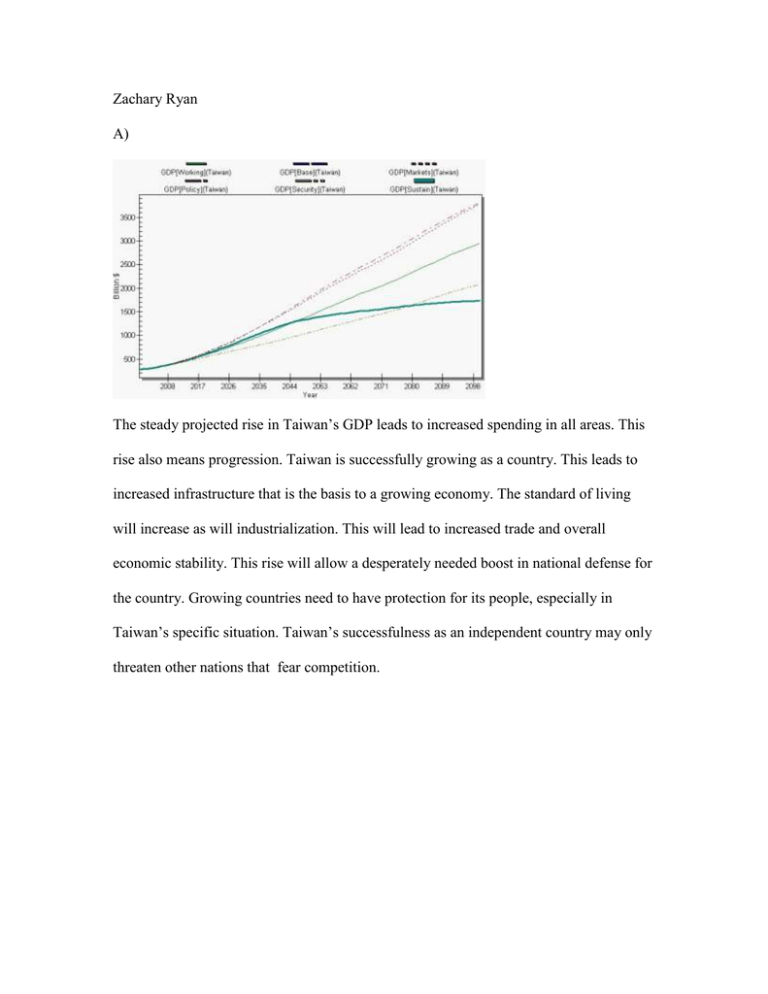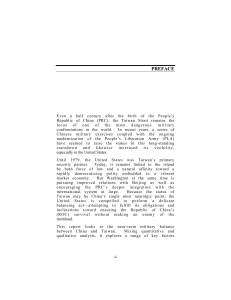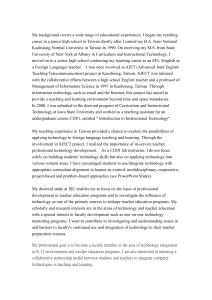Zachary Ryan A)
advertisement

Zachary Ryan A) The steady projected rise in Taiwan’s GDP leads to increased spending in all areas. This rise also means progression. Taiwan is successfully growing as a country. This leads to increased infrastructure that is the basis to a growing economy. The standard of living will increase as will industrialization. This will lead to increased trade and overall economic stability. This rise will allow a desperately needed boost in national defense for the country. Growing countries need to have protection for its people, especially in Taiwan’s specific situation. Taiwan’s successfulness as an independent country may only threaten other nations that fear competition. The projected population rise for Taiwan can only help this country. Over the next few years this increase will cause increased production for this nation. This increase in production may lead to increased spending and the ability to build up its armed forces. This along with a steady rise in GDP also infers a significant progression for the country of Taiwan. With this population boom National Security is needed more than ever. If an approach is not decided upon soon, it may be too late to implement it in the future. The Power index of Taiwan is important to recognize especially when it comes to the country’s future. A sudden drop within the next few years is followed by a projected steady increase for the next thirty. Although this increase may seem miniscule to other nations in the simulation it is important to note that Taiwan faces a potential boom within the next few years. This increase in the power index can be due to rises in the nation’s GDP which means more funds available for military spending. This economic boom also may lead to better living conditions that can attribute to a population boom that may seriously boost military numbers. The only explanation for this fall in the power index around the year 2040 is the country’s lack in defense. New technologies need to be obtained in order to secure Taiwan’s future. It is important to secure these defenses now as in the future it may be too late and too many resources will need to be allocated just to play catch up. B) The objectives of Taiwan’s armed forces are to protect the nation’s territory and its people. At this time the most direct threat to national security is Beijing’s refusal to abandon the use of military force against Taiwan. In 2005 China passed its “anti separation law” in order to adopt military force to “coerce” Taiwan into submission (GIO). Taiwan’s March 2005 election included a “defense referendum” which has been urged by the executive Yuan. The two referenda that faced voters was the purchase of anti-missile systems, and whether a peace framework for addressing cross straight differences should be adopted. Both referenda failed to achieve the required over 50% support from voters (Dept. of State). As of 2005 the military budget of Taiwan has been limited to about 2.3% of the nations GDP. A significant drop of what it used to be (around 4%) in 1994. These policy changes also lead to a significant decrease in Taiwan’s military numbers, although these numbers are still significantly large for Taiwan’s current military policy. The aims of Taiwan’s national defense can be summed up by its constitution that states: “Article 137. The national defense of the Republic of China shall have as its objective the safeguarding of national security and the preservation of world peace. The organization of national defense shall be prescribed by law. Article 138. The land, sea, and air forces of the whole country shall be above personal, regional, and party affiliations; shall be loyal to the state; and shall protect the people. The ROC National Defense Act 國防法 states in Article 2: The goal of the ROC's national defense is to protect national security and safeguard world peace through display of national strength as a whole and building of a national defense military force” (GIO). Taiwan’s armed forces weapons are obtained primarily from the US, although some ties have been made with other western nations. It is Taiwan’s goal to stress military self reliance. Taiwan adheres to the nuclear Non-Proliferation Treaty and has stated that it does not intend to produce nuclear weapons (Dept. of State). - Taiwan’s objective is to protect the nation’s territory and its people. - To obtain capabilities in missile defense and anti-submarine warfare to remedy vulnerabilities in countering the P.R.C.'s accelerated military modernization (Dept. of State). - Will respond to terrorism and other contingencies. C) As the progression of a better Taiwan continues it is the goal of the CMO to procure better defense opportunities for the country. With the rapid growth of China who has yet to renounce its use of force against Taiwan. It is the goal of this CMO to obtain better defense technologies to be recognized as a key character in East Asia. The obtainment of Patriot Advanced Capability missile defense systems, marine patrol aircraft, and diesel electric submarines are key. This would greatly increase national security. Not only does this provide a start to protection against other countries but against terrorist or revolutionary organizations that may be a danger to the advancement of a better Taiwan. Patrolled waterways will help with the security of our important export trade economy. Due to past reform initiatives it is not Taiwan’s immediate goal to increase military numbers, but the technology and equipment necessary to efficiently protect the country. Taiwan deserves the same protections that other countries have found necessary to protect their own people. Taiwan adheres to the principles of the nuclear Non-Proliferation Treaty and has absolutely no intention to produce nuclear weapons. It is only this CMO’s goal to remedy the vulnerabilities in Taiwan’s national defense. These concerns need to be pushed harder in this country’s political agenda as the people need to become aware of these vulnerabilities. http://www.gio.gov.tw/taiwan-website/5-gp/yearbook/p104.html#1 http://www.state.gov/r/pa/ei/bgn/35855.htm http://www.cnn.com/WORLD/ (Dept. of State) (GIO)





